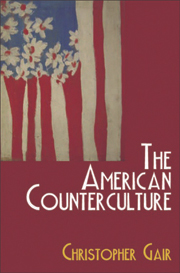6 - Music
from Part Two - 1961–1972
Published online by Cambridge University Press: 05 August 2013
Summary
One generation got old
One generation got soul
This generation got no destination to hold
Pick up the cry
Hey now it's time for you and me
Got a revolution
Jefferson Airplane, ‘Volunteers’ (1969)During the 1960s the music of the counterculture was transformed rapidly and repeatedly. At the start of the decade, the revival of interest in traditional American songs led to a folk boom coupling political protest with a near-obsessive insistence on the use of acoustic instruments in a quest for ‘authenticity’. By 1969, the year of Woodstock, a much larger countercultural community would think nothing of a festival combining Joan Baez with Jimi Hendrix, Richie Havens with The Who. Although such transformations involved a large element of accommodation to the American corporate economy, they also signalled a more overtly political slant to ‘youth’ music than had been the case in the 1940s and ‘50s. Bebop had been ‘alternative’ primarily in its experiments with musical orthodoxies and in the lifestyles of many of its performers – a combination that was, of course, political in the manner that it helped to redefine the African-American as musician rather than entertainer – and in its appeal to a relatively small number of listeners. Rock and roll had troubled the adult white hegemony because of its overt sexuality, perceived identification with juvenile delinquency and reliance on African-American art forms – as well as the racial integration of its audience – rather than for any demands for major political change in its lyrics.
- Type
- Chapter
- Information
- The American Counterculture , pp. 161 - 181Publisher: Edinburgh University PressPrint publication year: 2007



